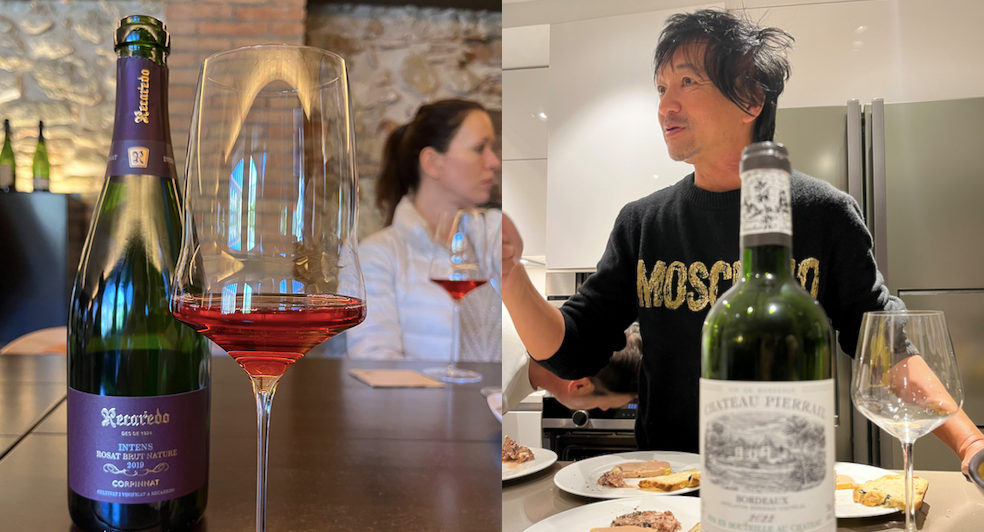Josephine – The Eccentric Mademoiselle
22nd May 2023

Tasting Recaredo Intens Rosat in another way
On my recent visit at Recaredo I discovered a new glass brand, the unique shaped Josephine. The Recaredo team is always keen on using the best glasses, plus they pay immense attention to pair a wine with its most appropriate glass partner. Still wines – Can Credo project – are mostly poured in the ethereal Zalto glasses while their long aged, brut nature sparkling wines are tasted from Riedel glasses. However, this time Josephine entered as well for the rose sparkling of the tasting.
Recaredo is a fabulous family winery with biodynamic farming, only with indigenous grapes, only with long aged, vintage and brut nature sparkling wines. This house was the first to create brut nature sparkling wine in Penedès in spite of the common taste of the time (Reserva Paricular) and it was also Recaredo, who produced the first single vineyard sparkling wine made of 100% of the local Xarel·lo grape. The winery building is situated in the middle of Sant Sadurní d’Anoia – to visit it is a must. Recaredo does not belong to CAVA DO any more, it is part of Corpinnat brand.
But let’s go back to Josephine
We were a group of 6 Hungarian seasoned winelovers, plus 4 French men including a top sommelier and a chateau owner. I must accept: Josephine begins to enchant the taster with its weird, yet elegant look and the veil like thin glass itself. Everything comes after the aesthetic pleasure. Smelling into the glass the red fruits started to show themselves: loads of cherry and also some fresh herbs. Josephine revealed a charming, enjoyable yet complex sparkling wine. We also tried the rosé from the Riedel glass – huge difference. First, I could feel some closed, slightly strange note, which might come from the long ageing. Since it is a vintage 2019 Intens Rosat (made of 100% Monastrell), the bottle had been closed for at least 3 years (disgorged not long before our tasting). Then this uncertainty disappeared and the wine appeared in its full complexity revealing layers after layers. As Elizabeth Gabay MW commented about this rosé, it might benefit from decanting. Probably Josephine does the decanting for us. Yet our group was quite divided, several of us – including me – said that the Riedel glass shows more of Intens Rosat, while with Josephine it might be more elegant, though less intense. But listen to the others:
– Dr Melinda Dósa, Hungary, lawyer (and educated wine expert): “In the Riedel glass the sparkling wine did not show much complexity. It started with restrained nose, while Josephine glass presented much more intense and complex aromas – it was incredible! There was depth, there were naughty bits of aromas creeping from somewhere behind, and these notes would have been impossible to discover in the other glass. It was like the moment when a matured red wine finally has the chance to take a deep breath – and in the decanter the closed notes open up.”
– Richard Bui, France, of Chateau Pierrail, Bordeaux: “Really interesting with 100% Monastrell grapes, first time I tried this. Very beautiful colour cherry, intense with notes of red fruits, floral. But more flavoured in the Riedel glass, develop aromas of marmelade, high intensity.”
So we cannot do justice today. We invite you to taste at Recaredo, taste Intense Rosat in both glasses and tell them, tell us your opinion!
Josephine – born of love
As I wrote at the beginning of this article, Josephine was a new discovery for me even though I taste usually from different glasses and most glass brands – including Zalto. After a little research I found that Josephine actually belongs to Zalto, though originally it was a German manufacture, the Austrian Zalto acquired it only in 2019 to revive the former splendour of the company. “A Silesian glassworks in the Sudeten Mountains, founded in 1842 by Count Leopold von Schaffgotsch and named after his beloved wife Josephine. The glassmaker Franz Pohl, head of Josephinenhütte, was a gifted creator and artistic pioneer who went beyond the boundaries of what was thought possible in glassmaking at the time. Thus, were created glass objects of technical sophistication and absolute beauty, which made the historic Josephinenhütte one of the most significant glassworks in Europe and the New World” – as we can read about the origins.
![]()
Ágnes Németh
Hungarian wine writer living in Penedes (Spain), in the heart of bubble production. Apart from passionately promoting Hungarian and Spanish wines, she constantly travels and tastes wine wonders of the world.
